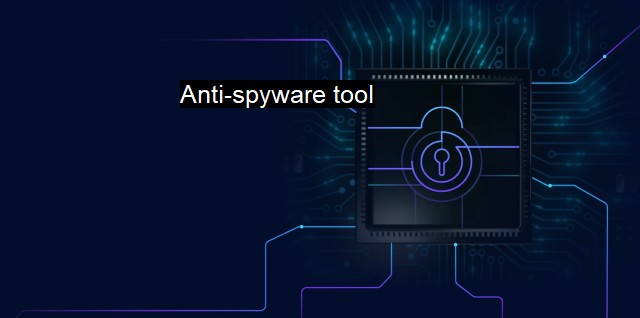What is Anti-spyware tool?
Securing Your Sensitive Data: The Importance of Anti-Spyware Tools in Today's Cybersecurity Landscape
An anti-spyware tool is a software application designed specifically to detect, remove, and protect against spyware – a type of malware that secretly observes the user's computer activities, collecting information without the user's consent. Hidden from the user, these malicious programs file snapshot views of the user's activities, such as browsing habits, passwords, credit card details, personal emails, or even the keystrokes. In cybersecurity and antivirus lexicons, an anti-spyware tool forms a cardinal bulwark against these significant threats.Though loosely lumped with antivirus software, anti-spyware tools operate somewhat differently. While antivirus software primarily targets viruses which self-replicate and potentially cause systemic damage to the computer, an anti-spyware tool is cosa nostra – designed with the inherent purpose of finding and extinguishing elusive spyware infections designed to stealthily filch personal information or to manipulate browsers and other applications.
Cybercriminals and hackers oftentimes leverage spyware as a pivotal force for malicious acts. Spyware can monitor and copy everything the user does online, including card transactions, passwords, accessing online accounts, and other personal data related activities. Therefore, the usage of anti-spyware tools is essential to ensure both personal data protection and cybersecurity.
Anti-spyware tools function prominently through two methodologies: real-time protection and on-demand scans. Real-time protection continuously monitors the computer for symptoms of spyware, alerting the user when such threats are detected, while on-demand scans manually scrub spyware off the computer. As such, real-time protection acts as a bodyguard always on duty.
One common technique that anti-spyware tools utilize is heuristic detection. Analogous to a detective working on a case, the tool observes a file's characteristics and behaviors, rather than solely focusing on signatures or definitions. If a new file, possibly even unknown to anti-spyware databases, behaves suspiciously – such as attempting to access sensitive information – then heuristic analysis will deem it malware, thus identifying even the typically elusive, freshly coined threats.
Complementing heuristic analysis, anti-spyware tools also apply signature-based detection. This approach involves the tool regularly updating its list of known spyware – the "signatures" – and working towards matching these with suspected files within the system. Like a book that's consistently updated, the tool's information database is ever-revolving, keeping it abreast of the ever-evolving spyware landscape.
Unfortunately, this constant revolution makes spyware considerably difficult to eliminate utterly. Symptomatic of a mutating virus, spyware alters itself to avert detection, making it notoriously elusive for removal. It's imperative then, going beyond just having an anti-spyware tool, for users to keep these tools updated routinely for optimal protection.
Despite occasional narrow delineation, the coalescence of anti-spyware and antivirus software has increasingly become standard practice in cybersecurity. Certain comprehensive security suites offer an integration of both antivirus and anti-spyware capabilities, maximizing the safety guards against various types of malware. These are typically more advanced anti-spyware tools. Institutions may purchase separate, more potent anti-spyware tools that offer even deeper layers of protective measures especially against corporate-targeted spyware attacks.
Anti-spyware tools are an essential reinforcement for online privacy and information protection. They ensure the necessary cybersecurity measures to ward off intrusions and attempts to steal personal data, keeping safe online spaces for businesses and personal users alike. They fortify the ramparts against the unceasing and constantly evolving threat of spyware – an insidiously ubiquitous and intrusive presence that jeopardizes personal and corporate cyber ecosystems. Regular updates and scans with trusted and reliable anti-spyware tools are mandatory habits in this digital age.

Anti-spyware tool FAQs
What is an anti-spyware tool?
An anti-spyware tool is a software application designed to detect and remove spyware, which is a type of malicious software that can gather information about a computer or its user without their knowledge or consent.How does an anti-spyware tool work?
Anti-spyware tools work by scanning a computer system for known patterns of spyware behavior, such as unauthorized data collection or changes to system settings. Once spyware is detected, the tool can either remove it outright or quarantine it so that it cannot cause further damage.Do I need an anti-spyware tool if I already have antivirus software?
While antivirus software can provide a certain level of protection against spyware, it is not always comprehensive. Many antivirus programs are designed to focus on viruses and other types of malware, and may not have the same specialized tools as a dedicated anti-spyware program. As such, it is generally recommended to use a combination of both antivirus and anti-spyware tools for optimal protection.What are some of the key features to look for in an anti-spyware tool?
Some important features to look for in an anti-spyware tool include real-time scanning and protection, automatic updates to keep up with new threats, customizable scanning options, and the ability to remove or quarantine detected spyware. It is also important to choose a tool from a reputable provider with a track record of effective protection against spyware and other types of malware.| | A | | | B | | | C | | | D | | | E | | | F | | | G | | | H | | | I | | | J | | | K | | | L | | | M | |
| | N | | | O | | | P | | | Q | | | R | | | S | | | T | | | U | | | V | | | W | | | X | | | Y | | | Z | |
| | 1 | | | 2 | | | 3 | | | 4 | | | 7 | | | 8 | | |||||||